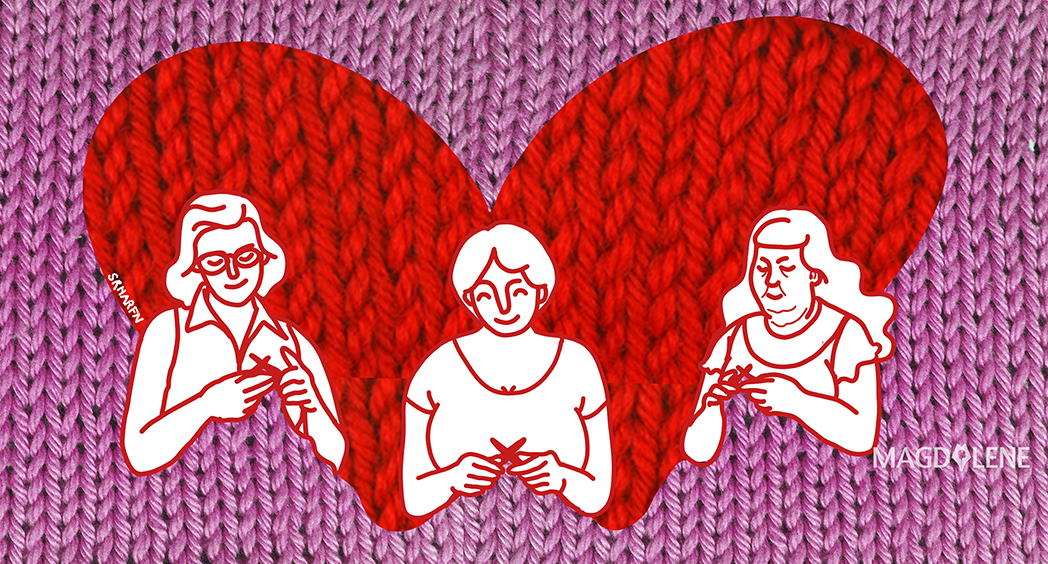I decided to learn to knit in October 2018. Having just returned to The Hague after six months of research in Indonesia, I was struggling with an anxiety that at times felt paralysing. Arts and crafts were never my forte, but knitting, I felt, might be a fun side activity that would allow me to get out of my head and work with my hands.
If you google “knitting lessons in The Hague”, you will likely come across the site of a cosy yarn shop and knitting parlour, called Cross and Woods. A few weeks after registering for their beginners’ class, I sat around a table with three other people to learn the basics of knitting: casting on and the knit and purl stitches. I felt slightly intimidated and unsure with myself, like a fish out of water. The dark cloud around my head that comes with my anxiety made me declare from the start, “I’m probably going to suck at this.” Pauline, our cheerful British instructor and shop co-owner, assured me that I wouldn’t.
Not used to doing much more than typing, my fingers clumsily held the yarn and needles. But the friendly chatter, the warm cup of coffee, and a mind focused on the task at hand eventually calmed my nerves and helped me feel at ease.
I found knitting magical. The fact that just two types of stitches, purl and knit, were able to transform into so many different patterns, mesmerised me. The online Ravelry community, where one can find a vast library of patterns such as the traditional fair-isle and cable knitting techniques or patterns inspired by medieval Islamic cotton embroidery, was like a treasure chest. Through the replication of patterns and techniques, knitting connects us to the women and men from centuries ago whose creativity we continue to reproduce today.
The next couple of days I spent hours knitting, wanting to commit the movements of my fingers into muscle memory. After experimenting on an entire ball of yarn, I was ready for my first knitting project: a blue wool hat. However, worried about my life-long collection of unfinished projects, there was a need to create a community that wouldn’t allow me to give up halfway. The International Institute of Social Studies (ISS), where I worked, can be an ideal place to initiate such a community. So, I circulated an email inviting people to “Take a break, let’s create!” once a week at the PhD common room. I promised snacks.
The knitting circle slowly grew, people came and left. We called ourselves the ‘Cro-Kni-Cal’ Circle for ‘Crochet, Knitting, and Calories’, acknowledging the snacks we munched on while we worked. Everyone was welcome to do their own projects (some people came to stitch and quilt) to ensure an inclusive creative circle. We came from different countries, ages, skin colours, and we are made up of PhDs, post-docs, and staff members.
Despite efforts to convince some male colleagues to join us, the idea of doing handicrafts every Wednesday only seemed to attract women. This, of course, isn’t much of a surprise. While there is actually a long history of male knitters, knitting and crocheting are traditionally considered feminine activities and have also become an artform for feminist activism. From pink knitted pussy-hats to bold feminists-inspired embroidery, needlework is a space more often dominated by women. And so it was a group of women whose bodies occupied the PhD common room at ISS every Wednesdays from 17.00-19.00, with our fingers busily creating, our mouths pleasantly chatting, and our minds temporarily taking a break from the pressures of research and deadlines.
One evening, I found myself among this circle of women and reflected at how comfortable I felt. Growing up, I tended to rebel against being classified as a “girl” and the limited activities that often came with it. As a child, whenever anyone referred to me as a “tomboy,” I felt a warmth of pride, as if having boy-like characteristics was somehow better than being “just a normal girl.” I sulked against doing household chores and wasn’t interested in learning any cooking skills from my mom (an attitude I severely regretted as an adult after realising that cooking skill is survival skill). Whenever we had guests at the house, my eyes rolled at “women talk” and I preferred instead to sit around with my dad and listen to the men talk “politics.”
Spaces are often gendered and as children we easily catch social cues that glorify male spaces and undervalue female ones. It has taken me the last decade or so to unlearn this. And while I still object the boxes that society often imposes on women; I finally found a sense of belonging within female-dominated spaces.
In February 2019, I had to return to Indonesia to continue my research. Despite my excitement to continue fieldwork, there was a slight sadness to leave the Cho-Kni-Cal Circle. Before I left, I spent a small fortune on yarns and needles and “armed” myself with enough knitting projects to keep my anxieties at bay.
Knitting has become a constant feature during this time in Indonesia. Whenever I managed to get a seat on the train commuting between Bogor and Jakarta, I’d knit. When waiting for interviews to start or for friends who were stuck in traffic, I’d knit. When my thoughts are racing all over the place, insomnia kicks in, and anxiety creeps into the dark corners of my mind, I’d knit. In Indonesia knitting became a way to drown out the overwhelming noises of urban life by focusing solely on the crossing of my needles and yarns.
For me, knitting also helps shape spaces for connecting. When visiting my parents in Makassar, I taught my mother how to knit. Knitting together was a rare bonding opportunity for us, since we have been living far away from each other for most of my adult life. During my fieldwork, two aunts of mine very generously allowed me to stay with them when I was in Bogor. They too had crochet projects of their own. Some afternoons, we would sit together and recreate the comfort of the Cro-Kni-Cal Circle in their living room. In these spaces, I’d sit up, knit, and appreciate the wisdoms handed down through “women talk,” which nowadays commonly includes, but is never limited to, a good dose of politics.








Comments